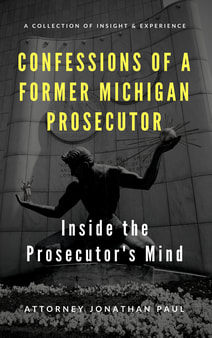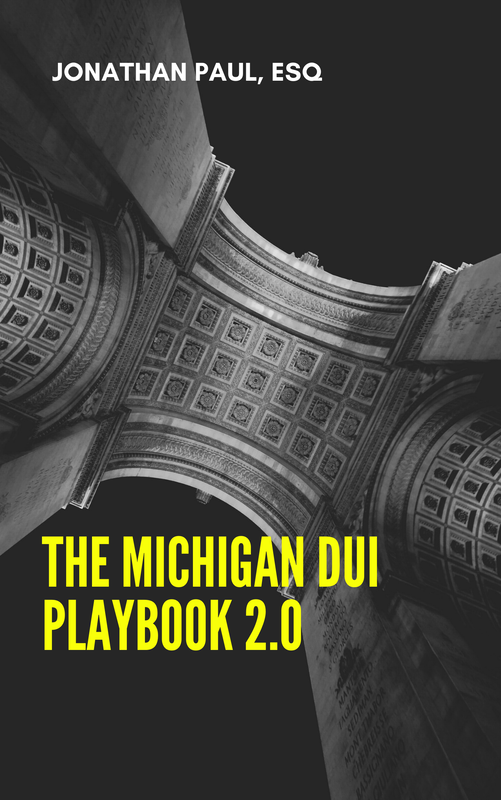|
When I handle a DUI case in Michigan, the first thing I look for is operation. You can’t have a drunk driving case without some driving. Most cases begin with an officer conducting a traffic stop where the operation is clear, and not contested. If my client’s driving is not as straightforward then I’m looking for the evidence that the prosecution will use to show he/she was the driver.
In this situation, the evidence usually comes right from my client’s mouth. It’s usually too late to swallow these words once charged, but in the right situation, we may be able to suppress these incriminating statements. As a prosecutor and defense lawyer, I’ve handled cases where there is no eyewitness to driving, and the defendant makes no such admissions about driving. That missing fact usually helps lead to a very favorable plea deal, or a strong defense at trial. Hearsay does not apply to the charged defendant in Michigan. A police officer can take the stand and testify that the defendant admitted to driving. In respect to that, the 5th Amendment protects the defendant from making any admissions, but most are voluntary without knowledge of the ramifications. This situation pops up a lot with my clients. My client tells me that they were not read their Miranda rights. They wonder if this alone could lead to a dismissal, and the answer is generally no. It may not even be required in the case depending on when the statements were made. When you’re pulled over by a police officer, or an officer pulls up along side an accident, the officer is allowed to ask questions to get information. Let’s assume my client is standing outside of his car with two friends when the police arrive. At this point there is no direct evidence of who was driving but rather only circumstantial evidence. The cop says to my client, where were you coming from? My client answers. The cop says, how did you hit the guardrail? My client answers. At this point, my client has admitted to driving. These statements are likely to be admissible, because they are not made during a custodial interrogation. In Michigan, a Custodial interrogation means questioning instigated by the police while a person is in custody, not necessarily arrested but not free to leave. Conversations while sitting inside your own car, or standing outside the vehicle are not in custody. There’s even case law that says when you’re sitting in a police car for “protection” or to get out of the bad weather, you’re not in custody. Whether a defendant is in custody for the purposes of Miranda is determined by considering the totality of the circumstances and asking whether a reasonable person in the defendant’s position would feel free to leave. Statements made that are not in response to police questioning are not subject to the protection of Miranda. Statements that fall into this category are spontaneous utterances, statements that are nonresponsive to the question asked, and volunteered statements made not in response to any question. Along with statements about driving, statements about drinking, leaving a bar, feeling intoxicated and other incriminating statements are usually admissible. So what sort of technique or strategy do I use when it comes to statements? I’m looking for a situation where the police arrive, and my client does not admit to driving. He either doesn’t say anything or denies it. The police will become frustrated and continue asking my client. As this goes on, they will likely start pushing for PBT’s, field sobriety tests, threatening an arrest and other signs of authority. At some point this struggle steps over the line, and my client in my view is now not feeling the freedom to leave, and is in custody. Hopefully my client is smart enough to ask straight out: am I free to leave? If the cop says no then we have a great argument to suppress any statements. A client should always force an officer to answer whether or not they are free to leave, because the officer will say no, and Miranda applies. My client may or may not admit to driving at this point. If he does, then we move to suppress this statement, and let the case go forward without this piece of evidence. We can use this to have further field sobriety, and chemical tests thrown out as well as we challenge the basis of the arrest. Or, we can use this defense at trial, because the admission of driving may be suppressed, and operation cannot be proven to the necessary legal proof. Now there could be circumstantial evidence of driving, but at least we’ve knocked the most incriminating evidence out of the prosecutor’s evidence. The police can save themselves a lot of trouble by properly reading their Miranda warnings to the client, but most cops only associate the warnings when they place handcuffs on the client. If the client speaks post Miranda well the statements may then be admissible depending on the facts of the case. Can my statements be used against me in a Michigan DUI case? Were my Miranda Rights Violated?2/22/2016
In a Michigan drunk driving cases, statements made by defendant's can be admitted against them at trial. These statements are not hearsay, but a party opponent admission.
If you've made any statements or a confession to the police about a crime in Michigan , you need an experienced Michigan criminal defense attorney to review those statements, and make a determination about their admissibility. A statement and/or confession can be very strong evidence against you, and an aggressive and early strategy is imperative. The first question to be asked is when and where did you speak to the police, and the circumstances around this interaction? If the interaction was initiated by the police after you were taken into custody then in order to have the statement used against you, the prosecution must show that you were given your Miranda warnings, which are: 1) You have the right to remain silent. 2) Anything you say can be used against you in a court of law. 3) You have the right to the presence of an attorney. 4) If you can't afford an attorney, one will be appointed prior to any questioning Custody is a tricky concept to understand. The test for custody is an objective one, i.e., given the surrounding circumstances, would a reasonable person have felt free to terminate the interrogation and leave; your age and lack of experience with law enforcement are not relevant. If you're held in police car prior to posting bond is in custody for Miranda purposes, and statement taken without advice of rights must be suppressed. Compare this to a situation where you're not under arrest yet, but volunteer to come down to the police station to give your side of the story. Once these rights have been read, you must be given the opportunity to exercise these rights throughout the interrogation, and must voluntarily, knowingly, and intelligently waive these rights before making a statement. Most police officers will have you orally waive these rights, and sign a written waiver. Any statements made during a traffic stop, sobriety tests or booking do not require Miranda warnings, and you should be mindful that any statements made could and will be used against you. It is not unusual for someone to be charged with drunk driving to make an admission to operating a vehicle and having a few drinks; these statements virtually make out the case against you before the police and prosecutor start their investigation, and put their case together. Along with the content of your statements, the police will make observations of slurred or incoherent speech, which could be used against you in a drunk driving case. It's also common for a Defendant to initiate a conversation or make a spontaneous incriminating statement; these statements are deemed voluntary, and can be used against you. If the police take a statement from you, it could be oral, written or recorded. If you write a statement, you will be asked to put your date of birth, your address and sign the statement. If you and your attorney wish to challenge the admissibility of your statements, you would request what is called a "Walker Hearing". The judge will hear testimony as to the circumstances behind the statement and rule if the statement is admissible based upon the voluntariness and compliance with Miranda. The judge will rule if the statement can be introduced at a trial. If the statement is deemed to be inadmissible, it cannot be introduced at trial against you. Some factors in determining if the statements were voluntary: - when the statement was taken, - where it was taken - who was present - any threats made? - any promises made? - any forced used? - any coercion used? - any trickery/deceit? - deprivation of sleep, food or medication? - intoxication or under the influence of drugs? Most statements in Michigan DUI cases come during the roadside conversation between the police officer and the driver. The courts have deemed this interaction not to be a custodial interrogation, but rather for the purpose of determining whether the driver is intoxicated; Miranda is not required at this point. |
Click to Email Me Categories
All
|
Ann Arbor Office LocationPlymouth Office Location |
Representing DUI Clients in MichiganRepresenting clients charged with a DUI in Ann Arbor, Canton, Brighton, Howell, Saline, Adrian, Taylor, Plymouth, Northville, Westland, Ypsilanti, Pittsfield Towsnhip, Warren, Sterling Heights, Farmington, Pontiac, Romulus, Lansing, Novi, South Lyon, Southfield, Birmingham, Bloomfield Hills, Royal Oak, Troy, Rochester, Jackson, East Lansing, Garden City, Livonia, Dearborn, Detroit, St Clair Shores, Hazel Park, Ferndale, Madison Heights, Waterford, Milford, Shelby Township Clarkston, Oak Park, Berkley, Fraser, Sterling Heights, Clinton Township and others throughout Washtenaw, Wayne, Monroe, Jackson, Genesee, Macomb, Ingham, Lenawee, Livingston and Oakland County.
|







